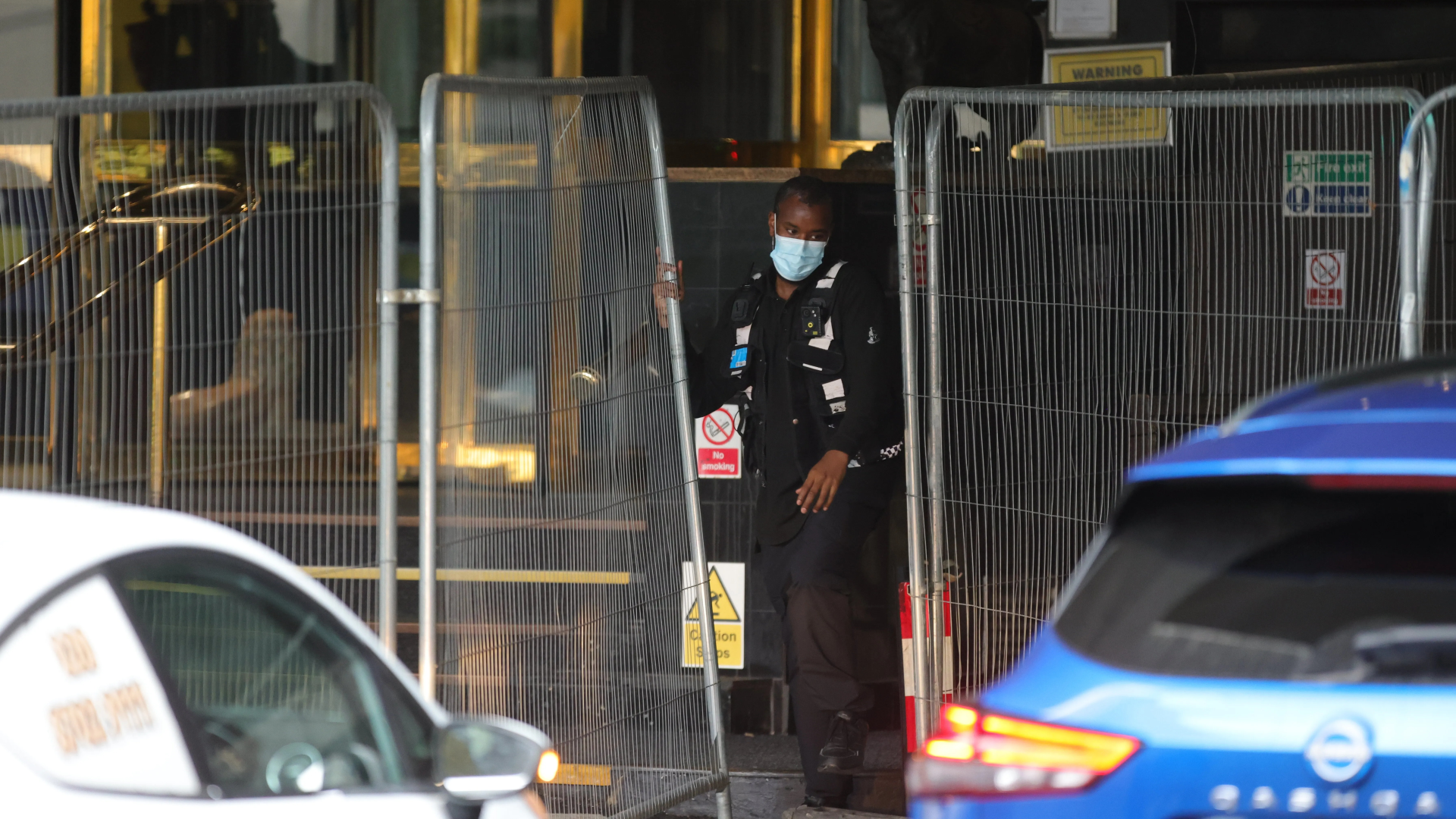Tensions are boiling over in parts of the UK as luxury hotels being used to house asylum seekers have sparked protests, political uproar, and a dramatic increase in security measures.
What started as a local controversy has now spread across multiple cities, drawing national attention and sparking a broader debate over immigration policy and community safety.
Fortress-Like Barriers Erected Around London Hotel Amid Growing Protests
In the heart of London’s Canary Wharf, towering barriers have now been placed outside the Britannia International Hotel — a high-end property recently repurposed to accommodate asylum seekers.
The decision comes after nights of protests outside the £425-a-night venue, as angry demonstrators clashed with police and demanded an end to the government’s migrant housing strategy.
Security has been beefed up significantly.
Guards in black uniforms and face coverings now patrol the site, while more than a dozen Metropolitan Police officers remain stationed outside.
The atmosphere is tense, with fears that more demonstrations could erupt in the days ahead.
Essex Hotel Faces Unrest After Serious Criminal Allegation Sparks Outrage
Just outside London, in the quiet town of Epping, residents are bracing for more disruption near The Bell Hotel — another site temporarily housing migrants.
Earlier this month, outrage erupted when an Ethiopian man staying at the hotel was charged with sexually assaulting school-aged girls.
Violent protests followed, prompting riot police to respond as anti-migrant groups hurled bricks and other objects.
In a bid to prevent further chaos, Essex Police delivered metal fencing to the hotel this week and issued a dispersal order across Epping’s town centre and transport stations.
Officers were granted powers to remove anyone suspected of antisocial behaviour, though the force has come under fire for its handling of the unrest.
Norfolk Joins the Protest Wave as Migrant Housing Controversy Spreads
The issue isn’t confined to London and Essex.
In Diss, Norfolk, over 150 people gathered in protest outside The Park Hotel after learning it would be converted to house single male asylum seekers instead of families.
This move by the Home Office has only intensified the already volatile situation across several towns.
Tiff Lynch of the Police Federation has warned that what happened in Epping might be the beginning of more widespread unrest.
She described the violent demonstrations as a “signal flare,” cautioning that if tensions keep escalating, local police forces may become too stretched to maintain control.
Political and Public Reaction Intensifies Amid Safety Concerns
The conversion of a four-star hotel in central London into migrant housing has been met with fierce criticism from locals, some of whom have had existing reservations cancelled.
Many residents and business owners have voiced their fears, saying they feel unsafe and unsupported.
The government has also taken heat from political opponents.
Shadow Home Secretary Chris Philp blasted the decision to house migrants in expensive, luxury hotels, arguing that it sends the wrong message and unfairly burdens taxpayers.
“It’s outrageous,” he said, “to use public funds for such accommodations when many Britons can’t afford a night in central London.”
Police Battle to Maintain Order as Accusations of Bias Fly
In the wake of the Epping protests, Essex Police have been accused of giving preferential treatment to pro-migrant activists.
Video footage appeared to show officers escorting Stand Up to Racism supporters to The Bell Hotel ahead of the clashes, a move that prompted Reform UK leader Nigel Farage to call for the Chief Constable’s resignation.
Chief Constable Ben-Julian Harrington rejected the accusations, denying claims that the force had bussed in protesters.
He insisted that the police only intervened to protect individuals at risk of harm and maintained that no political bias was involved.
“Our job is to keep everyone safe — residents, protesters, and those housed in the accommodation alike,” he said.
Police Presence Escalates at Key Protest Sites
Meanwhile, the Met Police confirmed they are keeping a visible presence outside the Britannia International Hotel to manage any demonstrations and keep the peace.
Officers are encouraging peaceful protest and warning that anyone crossing into criminal behaviour will be dealt with firmly.
A police spokesperson explained that their focus is on balancing protest rights with public safety: “We’re here to reassure local residents and ensure that life continues peacefully around these protests.”
Five Men Charged in Connection with Violent Protests
So far, five individuals have been charged following the violent scenes in Epping.
Four men face charges of violent disorder, while one man is accused of failing to remove a face covering when instructed.
The accused are scheduled to appear in court over the coming months.
The incidents followed the arrest of 41-year-old Hadush Kebatu from Ethiopia, who has denied all charges related to sexual offences against a minor.
He remains in custody as the legal process continues.
What Comes Next for the Government and Local Communities?
With summer underway and public frustration mounting, officials fear that this could only be the beginning of larger, more widespread unrest.
Prime Minister Sir Keir Starmer faces increasing pressure to address the crisis before it spirals out of control.
Critics are warning that if nothing changes, the UK could be headed toward a repeat of previous summers marked by mass protests and civil unrest.
For now, hotels like the Britannia and The Bell remain focal points of a national debate — one that blends immigration, safety, community identity, and the limits of state resources into a deeply complex and emotional issue.
Whether these tensions cool or erupt further will likely depend on how swiftly and effectively both local and national leaders respond.
